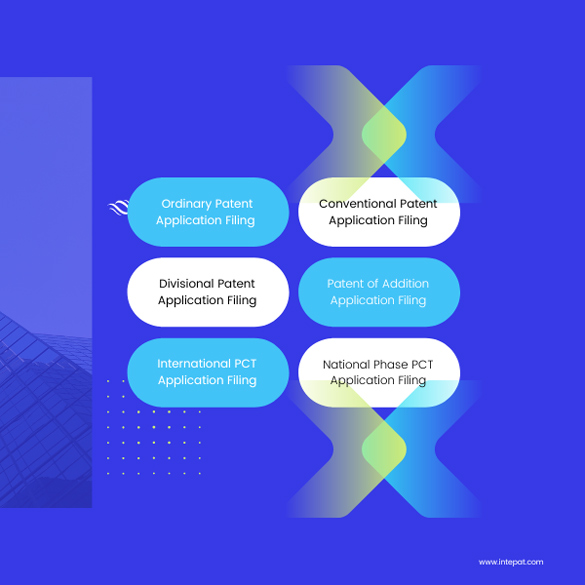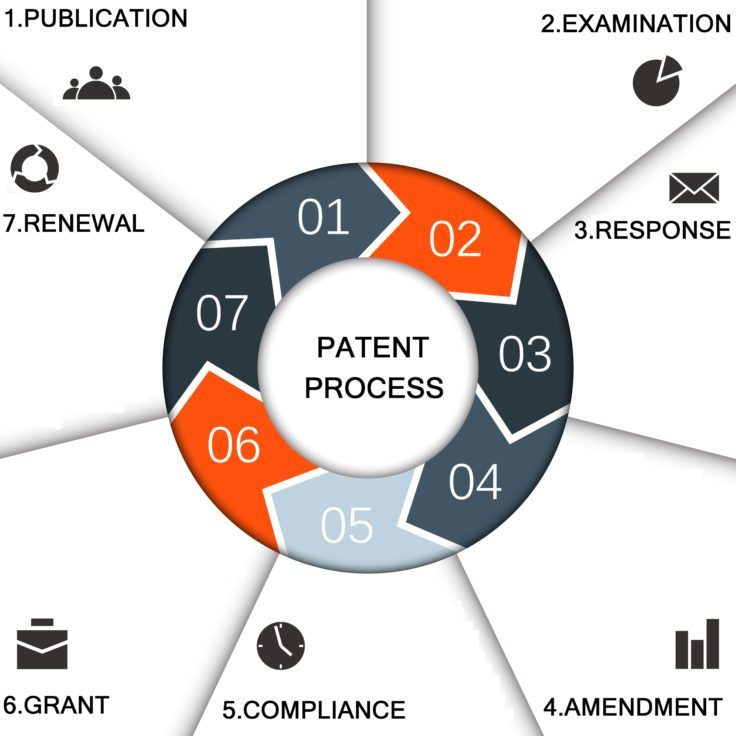
Patent Drafting Services
“Patent drafting” is considered one of the most complex techno-legal documents and the most crucial document in the entire patent registration process.
The specification contains the essential aspects of the invention. First, the aspects include a field of invention, background, and summary. In addition, the specification consists of a detailed description, patent drawings, abstract, and patent claims for which protection is sought.
Two types of patent specifications can be drafted based on the invention stage and the need of clients.
The provisional patent specification is mainly drafted and filed for two reasons. Firstly, it enables describing the invention for the initial phase of the invention. Secondly, it aims to secure the priority date of the invention. No patent is granted based on the provisional patent draft specification.
On the other hand, a non-provisional specification is drafted with patent claims for the invention. In general, the non-provisional are drafted for inventions that are ready to launch on the market. The non-provisional specification has to be drafted within 12 months from the date of provisional patent filing.
How can Intepat work with your goal?
We give utmost importance to drafting the provisional specification in detail, the same as that of the non-provisional.
Further, we ensure that all the essential features are covered while drafting patent for the provisional specification.
We provide detailed supportive descriptions to cover the necessary claims at a later stage. Similarly, drafting the non-provisional specification takes utmost care to include all the embodiments of an invention and the broadest scope of patent claims.
At Intepat, to draft patent specifications to perfection, we have a strong patent team comprising patent analysts, technologists, and patent attorneys.
Intepat’s team has blended patent law and technology skills and works in systematic internal processes to understand your invention and deliver quality patent specification drafts.
Our patent agents at Intepat can easily understand the significance of patent specification to meet the patent office’s formalities, thus taking the most care while reviewing and proofreading the patent specification.
Patent analysts at Intepat can expertly draft patents in various science and technology domains. We have experience drafting numerous patents for India, the US, Europe, and PCT for domestic and foreign clients in various technical fields.
We at Intepat also have the software tools required for illustrating the patent drawings needed along with the patent specification. The preliminary patent draft is provided for our client’s review within 10 to 15 days.
Patent Filing Services
To file a patent in India, an applicant can apply for a patent grant at the patent office in India. The jurisdiction of the patent office is determined based on where the applicant resides or has a place of business or an address for services.
Our specialized team consisting of patent agents and patent attorneys has an understanding of the intrinsic value of the patent as well as experience in successfully handling patent filing in India and various countries.
Further, our patent teams are fully acquainted with the legalities of patent filing procedures in India. We have represented many Indian and International clients to file patent applications in India.
In addition, we have an in-house developed cloud-based portfolio management system for docketing IP portfolios. It has been created with state-of-the-art technology to ensure data security.
Different types of applications include Ordinary Applications, Convention applications, Divisional Applications, Patent of Addition, and PCT National Phase applications.
Patent Filing in India – Ordinary Application:
A patent application without claiming priority of prior application refers to an ordinary application, which can be a provisional or a nonprovisional patent application.
We at Intepat utilize the E-filing of the Indian Patent Office to file the patent application for the grant of a patent and pay official electronic fees and furnish a patent specification with ease.
The non-provisional application will be filed directly or within 12 months from the provisional filing date.
Conventional Application:
A patent application that claims a priority date and priority of substantially similar inventions filed in one or more convention countries of the Paris convention refers to a convention patent application. The convention patent application is filed within 12 months from the date of the priority application.
We need a patent specification [in English] and priority application details to file a conventional patent application in India. Further, a certified copy of priority documents must be submitted to the patent office. These priority documents can be provided at the time of filing or within three months from the date of communication from the Patent Controller.
Divisional Application:
A patent application may be divided into the further application(s) in respect of the invention(s) disclosed in the main patent application. Such divided application refers to the divisional patent application. The date of filing, priority date, and the term of the patent for the claims of the divisional application shall be the same as of the main application.
Patent of Addition:
An applicant can file an additional patent application in India for an improvement or modification of the main patent or main patent application [also referred ‘parent patent’]. The applicant for the patent of addition should be the same as that of the main patent application. Besides, the patent of addition shall not be granted until the main patent has been granted.
Furthermore, the patent of addition shall not be granted if the main patent is ceased. Moreover, The patent of addition shall be discontinued if the main patent is not renewed. We need to pay only the patent filing fees in the patent of addition. And also, we don’t need to pay the additional renewal fees for the patent of addition.
Filing PCT Patent Application in India:
We at Intepat assist our Indian clients in filing international phase PCT applications in India or WIPO. The international phase of PCT is filed within 12 months from the priority date of the Indian patent application.
Filing National Phase PCT entry in India:
We at Intepat assist our International clients in filing their PCT patent applications in India. The national phase PCT applications are filed within 31 months from the priority date.
Filing International Patent Applications:
We at Intepat assist our Indian clients in filing conventional patent applications in various countries. Further, we handled national phase PCT patent applications in the PCT member countries. The PCT member countries include the USA, Europe, the UK, China, South Korea, and Japan.


Patent Registration Services
In the patent registration, the patent prosecution phase includes all the communications to and from the Indian Patent Office from the time of filing the patent application to the grant of the patent. After the patent grant, the patent will be in force only when the patentee pays the annuity fee regularly.
In the patent registration services, we provide end-to-end patent prosecution services that include a request for early publication, a request for examination, preparing a response to the examination report, pre-grant opposition, post-grant opposition, strategizing amendments for maximizing impact, attending hearings whenever required, and tracking the application during examination till grant.
Our specialized team consisting of patent agents and attorneys has an understanding of the intrinsic values of the patent well as the experience of successfully handling patent prosecution and patent registration in India, and is fully acquainted with the legalities of patent prosecution procedures in India.
Request for early publication:
A patent application is published automatically in the official journal after 18 months from the filing date or the priority date. The patent application becomes a part of prior art after publication. An applicant may request early publication before the expiry of 18 months. There are merits and demerits of early publication of the application. We strategically advise our client and weigh the pros and cons of early publication of the application based on the client’s requirements.
Request for examination:
A request for examination is essential in patent registration and can be filed within 48 months from the filing date or the priority date. The request is made using a prescribed form and paying the examination fee. If the request is not filed within the specified time, then the patent application will be deemed withdrawn. After filing the request for examination, the controllers refer the application to the examiner. The request for examination can be filed after the publication of the application or along with the request for early publication, or at the time of filing based on the need of clients. Further, the Applicant can file the expedited examination in India based on eligibility.
Response to examination report:
After the examination is conducted under sections 12 and 13 of the Indian Patent Act 1970, the Patent Office will issue an examination report to the Applicant. The report may contain objections related to application formalities and patentability of inventions following the Indian Patent Act. After that, the Applicant must comply with the requirements within six months from the date of the report. We at Intepat diligently analyze the objection raised in the examination report, strategically draft the response based on the cited prior art, and amend the patent claims or specifications if needed to comply with the objections.
Pre-grant opposition:
Any third party can file the pre-grant opposition under section 25(1) before the grant date. An application of representation for opposition to the grant of a patent is filed in a prescribed form without any statutory fee. The grounds of opposition can include one or more grounds mentioned under section 25(1), subsection (2), sub-section (3) of section 29, or section 8 of the Indian Patent Act. The patent applicant may contest the opposition. We assist our client in preparing, drafting, and filing the pre-grant opposition proceedings before patent registration in India.
Post-grant opposition:
Any third party can file the post-grant opposition under section 25(2) at any time after the grant but before the expiry of 1 year from the patent grant’s publication date. A notice of opposition is filed in a prescribed form along with the prescribed fee. The grounds of opposition can include one or more grounds mentioned under section 25(2), subsection (2), sub-section (3) of section 29, or section 8 of the Indian Patent Act. The patentee may contest the opposition. We assist our client in preparing, drafting, and filing the post-grant opposition proceedings after patent registration in India.
Patent annuity fee:
The order of patent grant is given if all the requirements of the Patent Act are met. The term of a patent is 20 years from the date of filing or the priority date of filing. However, in the national phase of PCT application in India, the term of the patent is 20 years from the International filing date. The patent’s annuity fee must be paid from the 3rd year until the 20th year from the application’s filing date. We at Intepat will send an automatic reminder to make the patent annuity fee within the timeline through our system and assist our client in filing the patent annuity fee.
Statement and undertaking:
Filing a statement and undertaking under section (8) is a crucial step in patent registration in India. The statement and undertaking are filed in a prescribed form without any statutory fee. The Applicant needs to undertake that he would keep the Controller informed in writing about the details regarding corresponding applications for patents filed outside India from time to time. We at Intepat will send an automatic reminder to provide the related foreign patent filing details and submit the statement within the prescribed timeline.
Statement of working of patent:
After a patent grant, filing a statement of working on the patent is mandatory and significant in India’s patent registration process. It must be submitted to the Controller every year. The statement of working of the patent is filed in a prescribed form along with the details of working of the patent without any statutory fee. Failure to submit the information about working is punishable and can attract a hefty fine of up to INR10 Lacs. We at Intepat will send an automatic reminder for filing such a statement within the timeline through our system and assist our client in preparing and filing the statement of working of a patent.
Obtaining a certified copy:
There are instances to obtain the certified copy of patent documents from the Indian patent office, as it may be required for a legal proceeding or may require submitting the certified copy of the application to the International Bureau of WIPO, or may require the submit the certified copy of the application to the patent offices where a conventional application is filed by claiming the priority of Indian application. We assist our clients in preparing, filing, and obtaining certified copies of patent documents in India for further processing.
Obtaining a foreign filing license:
A request for permission to make a patent application outside India is filed in a prescribed form along with the prescribed fee to obtain a foreign filing license. The foreign filing license is written permission obtained from the Patent Office India. In case the Indian Applicant wishes to file a patent application outside India without first filing in India. He should get a foreign filing license from the Indian Patent Office. Indian applicants must obtain the license before filing a patent application outside India, and failure to meet such requirements may lead to heavy penalties. Therefore, we take diligent measures while filing a patent application outside India for our clients, and we assist our clients in obtaining a foreign filing license before filing outside India.
Alternatively, without obtaining the license, an Indian applicant can file a patent application first in India and, after that, can file the same application outside India only after six weeks from the filing date of the Indian application.
Amendment of the patent application and patent:
According to section (57) of the Indian Patent Act 1970, an applicant or patentee can file a request for amendment of an application, a complete specification, or any documents relating to that. The amendment for the application or patent can be filed at any time before or after a grant of the patent.
There are instances where the Applicant or patentee may wish to transfer the patent rights to another person or may want to include additional inventor(s), as the case may be. Further, there may be a need to change the Applicant’s name, address, or service address.
Before the application examination, the Applicant may wish to amend the specification or claims within the scope of the invention or may need to amend the same to overcome objections during the examination. After a patent grant also, we can request an amendment for patent specification or claims or the inclusion of test results or details of the prototype. However, the amendment should fall within the scope of the original specification and/or claims. We at Intepat assist our clients in filing the amendment of application or patent after the diligent review of the request.
PCT Patent Filing in India
PCT patent application is an international patent application filed at WIPO or receiving office. India is a member of the Patent Cooperation Treaty, which entails Indian citizens to file patent applications in the member countries of the PCT as well as entails foreign and Indian applicants to get patent protection in India by entering into the national phase of PCT application India after filing their PCT patent application at WIPO.
The convention application needs to be filed in the members’ countries of the Paris convention within one year from the priority application.
The main advantage of filing a PCT application is that the filing in PCT member countries can be extended to around 30 months or 31 months, depending on country-specific patent laws. In India, the timeline is 31 months. Further, based on the international search report from the International Search Authority [ISA] or the written opinion, the applicant can evaluate the reasonable patentability of the invention in the regions or countries where the patent is sought.
How can Intepat work to achieve your goal?
At Intepat, our well-experienced team handles PCT applications with ease. Besides, we have had the experience of filing numerous PCT applications in India. There have been many instances wherein we successfully managed national phase PCT applications in India and outside India.
Intepat’s patent agents are authorized to file PCT applications in India and/or at WIPO and have partnered with patent law firms/attorneys in various countries. We can handle the PCT applications in the following three scenarios.
- Filing PCT application in India or WIPO within 12 months from the priority date of Indian patent application for Indian clients. The official PCT fees include the filing fee, international search fee, and transmittal fee, and it varies based on the nature of the applicant and the selection of the international search authority [ISA].
- Filing national phase patent applications of Indian applicants in the PCT member countries such as UPSTO, Japan, China, South Korea, EPO (Europe), United Kingdom, Germany, and France, among others [within 30 or 31 months from the priority date of Indian patent application].
- Filing national phase PCT patent application in India within 31 months from the application’s priority date for International clients.

